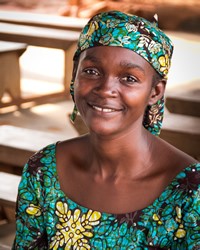Ngbakas arrived on the Gemena Plateau in 1920. They now live in three countries in Central Africa and speak their Ngbaka language. There are at least three Ngbaka subgroups divided by dialect. Each of these dialects is mutually intelligible.
The Ngbaka highly value their language. They started a literacy program, which has resulted in thousands who speak it. Ngbaka is taught in some of their schools.
There is no wild game in the Ngbaka homeland. They have only a little livestock, mainly chickens for eggs and poultry. Their other protein comes from fishing, which is done by the women. They grow manioc, maize, sorghum and bananas.
Blacksmiths have a high status in Ngbaka society. He makes necessary objects like hoes, rakes and shovels. Blacksmiths also make arrowheads for their few hunting expeditions.
Ngbaka Traditional religion involves a supreme god named Gale or Gbonboso. He revealed himself through two messengers, Seto and Nabo. Seto and Nabo are their ancestors. They give respect to these ancestors through a wooden image that they place each day on a family altar. They believe this wooden image protects the family from harm and can be called upon to cure sicknesses. Some also indulge in divination.
The Ngbaka are also highly Christianized, though they still hold to these ancient practices.
The Ngbakas need to put all their faith in Jesus Christ, the only one who has the power to protect and to guide.
Pray for a Christ-centered revival to affect every Ngbaka family.
Pray for many Ngbakas to disciple others.
Pray for them to have a record-high harvest this year as a testimony of God s goodness and power.
Scripture Prayers for the Ngbaka in Congo, Democratic Republic of.
https://www.101lasttribes.com/tribes/ngbaka.html
https://www.webonary.org/ngbaka/overview/introduction/?lang=en
https://www.gateway-africa.com/tribe/ngbaka_tribe.html
| Profile Source: Joshua Project |










